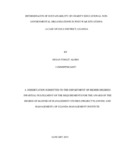Determinants of sustainability of charity educational non-governmental organizations in post-war situations: a case of Gulu district, Uganda
Abstract
The study sought to establish the determinants of sustainability of charity educational NGOs
in post war situation; a case of Gulu District. It was prompted by the drastic number of
educational NGOs that were either closing their shops or eliminating the education
component from their activities. The researcher adopted a cross sectional survey design,
used structured questionnaires, interview guide and observation checklist to collect raw
data, analysed by descriptive analysis and the SPSS program. The findings revealed that
sustainability is enhanced by; use of appropriate implementation strategies that are
participatory and involved all stakeholders. It indicated that sustainability subsisted on a
strong resource base and depended on diversified strategies to bring in more resources.
Favorable legal environment, sustainability policies as well as the roles and involvement of
the founders, enhanced educational NGOs sustainability. It concluded that; NGOs have
clear implementation strategies, affected by inadequate and insufficient funds. Sustainability
of the NGOs greatly depends on legal environment, shaped by government and donor
policies. More NGOs are religious founded and owned, although others exist. Founders
provide various supports to the NGOs thus ensuring sustainability. The study recommended
that governments should evenly distribute its structures in all rural areas; NGOs should use
alternative local resource mobilisation options and twin during fund application. NGOs
should operate within government and donor legal frameworks. Policies guiding NGOs
founders and staff’s behaviors will ensure quality service delivery. It also recommended the
need to investigate other methods of resource mobilisation opted for by NGOs; investigate
further the legal environment most respondents were undecided about and develop and
verify the model of educational NGO’s sustainability in post-war areas.

